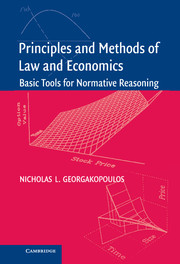Book contents
- Frontmatter
- Contents
- Preface
- INTRODUCTION: INNOVATION IN LEGAL THINKING
- PART 1 PRINCIPLES
- 1 FROM FORMAL LOGIC TO NORMATIVE REASONING
- 2 SOCIAL WELFARE VERSUS MORAL PHILOSOPHY
- 3 FROM POLITICAL PHILOSOPHY TO GAME THEORY
- 4 THE IMPORTANCE OF DISTRIBUTION OF WEALTH
- 5 COASE AND LAW'S IRRELEVANCE
- 6 MORE FAILURES OF COASEAN IRRELEVANCE
- PART 2 METHODS
- APPENDIX A MEINHARD V. SALMON 249 N.Y. 458 (1928)
- APPENDIX B GLOSSARY
- APPENDIX C MATHEMATICA NOTEBOOKS
- Index
6 - MORE FAILURES OF COASEAN IRRELEVANCE
Published online by Cambridge University Press: 24 July 2009
- Frontmatter
- Contents
- Preface
- INTRODUCTION: INNOVATION IN LEGAL THINKING
- PART 1 PRINCIPLES
- 1 FROM FORMAL LOGIC TO NORMATIVE REASONING
- 2 SOCIAL WELFARE VERSUS MORAL PHILOSOPHY
- 3 FROM POLITICAL PHILOSOPHY TO GAME THEORY
- 4 THE IMPORTANCE OF DISTRIBUTION OF WEALTH
- 5 COASE AND LAW'S IRRELEVANCE
- 6 MORE FAILURES OF COASEAN IRRELEVANCE
- PART 2 METHODS
- APPENDIX A MEINHARD V. SALMON 249 N.Y. 458 (1928)
- APPENDIX B GLOSSARY
- APPENDIX C MATHEMATICA NOTEBOOKS
- Index
Summary
The previous chapter introduced the normative use of Coasean irrelevance and the main obstacle to irrelevance, transaction costs. This chapter continues by exploring the less conventional reasons that prevent irrelevance.
NEGOTIATION HOLDOUTS
The standard analysis of Coasean irrelevance presumes that the parties reach an agreement in every instance where it is advantageous for them, that is, whenever the total gains exceed the total costs, including transaction costs. In an ideal world of perfect and symmetric information, each side knows the other side's valuation and, when room for it exists, an agreement seems inescapable. In a world of imperfect information, however, occasional bluffs and ruses are plausible negotiating tactics. The side that seeks the advantage by the “holdout” negotiating tactic does risk losing the agreement. This means that Coasean irrelevance may occasionally fail despite that an attractive bargain is available. The bargain is not reached because of bargaining tactics that prevent it.
This failure seems highly artificial without an example that shows the potential appeal of “holdout” tactics. Suppose that the gain from each agreement between a rancher and a farmer about fencing is 20 and they would normally split it equally. Ranchers know, however, that 20 percent of the farmers succumb to hard negotiating tactics and accept 3, leaving 17 for the rancher. A 5 percent fraction of farmers dislikes hard negotiation and refuses to deal after experiencing it. If a rancher expects 100 negotiations with farmers, cooperative negotiation produces 10 for the rancher in all 100 instances.
- Type
- Chapter
- Information
- Principles and Methods of Law and EconomicsEnhancing Normative Analysis, pp. 112 - 126Publisher: Cambridge University PressPrint publication year: 2005



